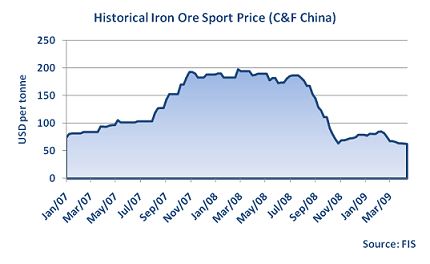

Explore the Archive
- Risk Notices Ltd
- Risk Notices SA
- Default Fund Notices SA
- Circulars
- Flash infos Bonds & Repos
- Flash infos Derivatives
- Flash infos Equities
- Flash infos Other
- Fixed Income Notices Ltd
- Legal Notices SA
- Membership Notices SA
- General Information
- General Member Meetings
- Press Releases
- SA Completion of Application Documentation
- SA Clearing Specifications
- SwapClear Legal Documentation
| Contact: | Andrea Schlaepfer/Rachael Harper, Corporate Communications, London
Tel: +44 (0) 20 7426 7463 / 7175 |
LCH.Clearnet set to clear Iron Ore swaps
London, 06 May 2009
LCH.Clearnet is set to launch clearing of over-the-counter (OTC) iron ore swap contracts. The service will be introduced in May 2009.
Iron ore is one of the main raw materials used to make steel. Iron ore swap contracts are vital in managing risk against volatile price movements. The introduction of clearing is essential for further growth of this market, as it will increase trading capacity and reduce concerns over counterparty risk.
850 million tonnes of iron ore with a market value of 160 billion was shipped in 2008, confirming the importance of the commodity and its potential. Up until now, 85 percent of iron ore is sold on an annual basis but with recent volatility, credit issues and global steel demand down 14.9 percent in 2009 to 1.02 billion tonnes, there has been a move to spot iron ore trading.
LCH.Clearnet is working closely with FIS, a leading OTC iron ore and freight broker, to provide industry participants with in-depth knowledge on this global market.
John Banaszkiewicz, Managing Director of Freight Investor Services (FIS), said “We are pleased to have been working exclusively with LCH.Clearnet on this project. Last April, the spot value reached a high of $187 USD delivered China. Today’s values are $60 USD which have created a need for a cleared derivative contract and abolishment of the old iron ore pricing mechanism. In addition, to combine this with the existing freight derivative contract, FIS is in a strong position to develop its clients’ risk management and drive the market forward.”
The contracts will be monthly cash-settled swaps, based on industry published reference prices.
Industry users also welcomed the introduction of a cleared contract:
Mark Lyons, Trading Manager, Iron Ore and Steel Derivatives at Cargill said “Cargill has been trading iron ore swaps for 9 months and now the availability of an exchange cleared contract will enable us to protect the value of assets and will also result in improved transparency for the buyers and sellers, particularly beneficial to the mills and mines.”
Isabella Kurek-Smith, Director, Energy and Freight said: “Introducing our specialist OTC clearing services will increase market participation and provide security to the expanding iron ore swap market. This product complements our existing OTC Freight service; as the leading clearer of Freight Forward Agreements, members, and their clients, will benefit from cross-margining opportunities between these markets.”

To view the press release as a pdf click here.
About LCH.Clearnet
LCH.Clearnet is the leading independent central counterparty group (CCP) in Europe, serving major international exchanges and platforms, as well as a range of OTC markets. It clears a broad range of asset classes including: securities, exchange traded derivatives, energy, freight, interbank interest rate swaps and euro and sterling denominated bonds and repos; and works closely with market participants and exchanges to identify and develop clearing services for new asset classes.
As a CCP, LCH.Clearnet sits in the middle of a trade, assuming the counterparty risk involved when two parties (or members) trade. When the trade is registered with LCH.Clearnet, it becomes the legal counterparty to the trade, ensuring the financial performance; if one of the parties fails, LCH.Clearnet steps in. By assuming the counterparty risk, LCH.Clearnet underpins many important financial markets, facilitating trading and increasing confidence within the market.
Initial and variation margin (or collateral) is collected from LCH.Clearnet members; should they fail, this margin is used to fulfill their obligations. The amount of margin is decided by LCH.Clearnet’s highly experienced risk management teams, who assess a member’s positions and market risk on a daily basis. Both the soundness of the risk management approach and the resilience of its systems have been proven in recent times.
LCH.Clearnet is regulated or overseen by the national securities regulator and/or central bank in each jurisdiction from which it operates.